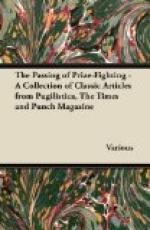Such is an imperfect sketch of the five languages appertaining to man. There is, however, one other—that which forms the subject of the present article—Pantomime, and which may be considered as the natural form of the visible language—literature being taken as the artificial. This is the most primitive as well as most comprehensive, of all. It is the earliest, as it is the most intuitive—the smiles and frowns of the mother being the first signs understood by the infant. Indeed, if we consider for a moment that all existence is but a Pantomime, of which Time is the harlequin, changing to-day into yesterday, summer into winter, youth into old age, and life into death, and we but the clowns who bear the kicks and buffets of the scene, we cannot fail to desire the general cultivation of an art which constitutes the very essence of existence itself. “Speech,” says Talleyrand, that profound political pantomimist, “was given to conceal our thoughts;” and truly this is the chief use to which it is applied. We are continually clamouring for acts in lieu of words. Let but the art of Pantomime become universal, and this grand desideratum must be obtained. Then we shall find that candidates, instead of being able, as now, to become legislators by simply professing to be patriots, will be placed in the awkward predicament of having first to act as such; and that the clergy, in lieu of taking a tenth part of the produce for the mere preaching of Christianity, will be obliged to sacrifice at least a portion to charitable purposes, and practise it.
Indeed, we are thoroughly convinced, that when the manifold advantages of this beautiful art shall be generally known, it cannot fail of becoming the principle of universal communication. Nor do we despair of ultimately finding the elegant Lord A. avowing his love for the beautiful Miss B., by gently closing one of his eyes, and the fair lady tenderly expressing that doubt and incredulity which are the invariable concomitants of “Love’s young dream,” by a gentle indication with the dexter hand over the sinister shoulder.
[Illustration]
* * * * *
AN ALLIGATOR CHAIRMAN.
An action was recently brought in the Court of Queen’s Bench against Mr. Walter, to recover a sum of money expended by a person named Clark, in wine, spirits, malt liquors, and other refreshments, during a contest for the representation of the borough of Southwark. One of the witnesses, who it appears was chairman of Mr. Walter’s committee, swore that every thing the committee had to eat or drink went through him. By a remarkable coincidence, the counsel for the plaintiff in this tippling case was Mr. Lush.




